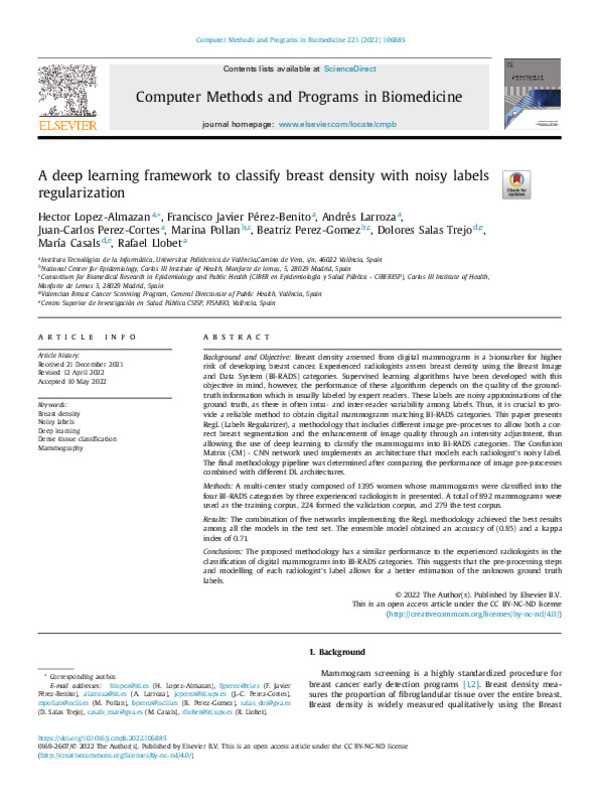JavaScript is disabled for your browser. Some features of this site may not work without it.
Buscar en RiuNet
Listar
Mi cuenta
Estadísticas
Ayuda RiuNet
Admin. UPV
A Deep Learning Framework to classify Breast Density with Noisy Labels Regularization
Mostrar el registro sencillo del ítem
Ficheros en el ítem
| dc.contributor.author | López-Almazán, Héctor
|
es_ES |
| dc.contributor.author | Perez-Benito, Francisco Javier
|
es_ES |
| dc.contributor.author | Larroza, Andrés
|
es_ES |
| dc.contributor.author | Perez-Cortes, Juan-Carlos
|
es_ES |
| dc.contributor.author | Pollán, Marina
|
es_ES |
| dc.contributor.author | Perez-Gomez, Beatriz
|
es_ES |
| dc.contributor.author | Salas-Trejo, Dolores
|
es_ES |
| dc.contributor.author | Casals, María
|
es_ES |
| dc.contributor.author | Llobet Azpitarte, Rafael
|
es_ES |
| dc.date.accessioned | 2023-03-24T19:01:18Z | |
| dc.date.available | 2023-03-24T19:01:18Z | |
| dc.date.issued | 2022-06-01 | es_ES |
| dc.identifier.issn | 0169-2607 | es_ES |
| dc.identifier.uri | http://hdl.handle.net/10251/192600 | |
| dc.description.abstract | [EN] Background and Objective: Breast density assessed from digital mammograms is a biomarker for higher risk of developing breast cancer. Experienced radiologists assess breast density using the Breast Image and Data System (BI-RADS) categories. Supervised learning algorithms have been developed with this objective in mind, however, the performance of these algorithms depends on the quality of the ground truth information which is usually labeled by expert readers. These labels are noisy approximations of the ground truth, as there is often intra-and inter-reader variability among labels. Thus, it is crucial to provide a reliable method to obtain digital mammograms matching BI-RADS categories. This paper presents RegL (Labels Regularizer), a methodology that includes different image pre-processes to allow both a correct breast segmentation and the enhancement of image quality through an intensity adjustment, thus allowing the use of deep learning to classify the mammograms into BI-RADS categories. The Confusion Matrix (CM) CNN network used implements an architecture that models each radiologist's noisy label. The final methodology pipeline was determined after comparing the performance of image pre-processes combined with different DL architectures.Methods: A multi-center study composed of 1395 women whose mammograms were classified into the four BI-RADS categories by three experienced radiologists is presented. A total of 892 mammograms were used as the training corpus, 224 formed the validation corpus, and 279 the test corpus.Results: The combination of five networks implementing the RegL methodology achieved the best results among all the models in the test set. The ensemble model obtained an accuracy of (0.85) and a kappa index of 0.71. Conclusions: The proposed methodology has a similar performance to the experienced radiologists in the classification of digital mammograms into BI-RADS categories. This suggests that the pre-processing steps and modelling of each radiologist's label allows for a better estimation of the unknown ground truth labels. | es_ES |
| dc.description.sponsorship | This work was partially funded by Generalitat Valenciana through IVACE (Valencian Institute of Business Competitiveness) distributed nominatively to Valencian technological innovation centres under project expedient IMAMCN/2021/1. | es_ES |
| dc.language | Inglés | es_ES |
| dc.publisher | Elsevier | es_ES |
| dc.relation.ispartof | Computer Methods and Programs in Biomedicine | es_ES |
| dc.rights | Reconocimiento - No comercial - Sin obra derivada (by-nc-nd) | es_ES |
| dc.subject | Breast density | es_ES |
| dc.subject | Noisy labels | es_ES |
| dc.subject | Deep learning | es_ES |
| dc.subject | Dense tissue classification | es_ES |
| dc.subject | Mammography | es_ES |
| dc.subject.classification | LENGUAJES Y SISTEMAS INFORMATICOS | es_ES |
| dc.subject.classification | ARQUITECTURA Y TECNOLOGIA DE COMPUTADORES | es_ES |
| dc.subject.classification | MATEMATICA APLICADA | es_ES |
| dc.title | A Deep Learning Framework to classify Breast Density with Noisy Labels Regularization | es_ES |
| dc.type | Artículo | es_ES |
| dc.identifier.doi | 10.1016/j.cmpb.2022.106885 | es_ES |
| dc.relation.projectID | info:eu-repo/grantAgreement/IVACE//IMAMCN%2F2021%2F1/ | es_ES |
| dc.rights.accessRights | Abierto | es_ES |
| dc.contributor.affiliation | Universitat Politècnica de València. Escola Tècnica Superior d'Enginyeria Informàtica | es_ES |
| dc.contributor.affiliation | Universitat Politècnica de València. Escuela Técnica Superior de Ingenieros de Telecomunicación - Escola Tècnica Superior d'Enginyers de Telecomunicació | es_ES |
| dc.description.bibliographicCitation | López-Almazán, H.; Perez-Benito, FJ.; Larroza, A.; Perez-Cortes, J.; Pollán, M.; Perez-Gomez, B.; Salas-Trejo, D.... (2022). A Deep Learning Framework to classify Breast Density with Noisy Labels Regularization. Computer Methods and Programs in Biomedicine. 221:1-11. https://doi.org/10.1016/j.cmpb.2022.106885 | es_ES |
| dc.description.accrualMethod | S | es_ES |
| dc.relation.publisherversion | https:\\doi.org\10.1016/j.cmpb.2022.106885 | es_ES |
| dc.description.upvformatpinicio | 1 | es_ES |
| dc.description.upvformatpfin | 11 | es_ES |
| dc.type.version | info:eu-repo/semantics/publishedVersion | es_ES |
| dc.description.volume | 221 | es_ES |
| dc.identifier.pmid | 35594581 | es_ES |
| dc.relation.pasarela | S\465306 | es_ES |
| dc.contributor.funder | Institut Valencià de Competitivitat Empresarial | es_ES |








